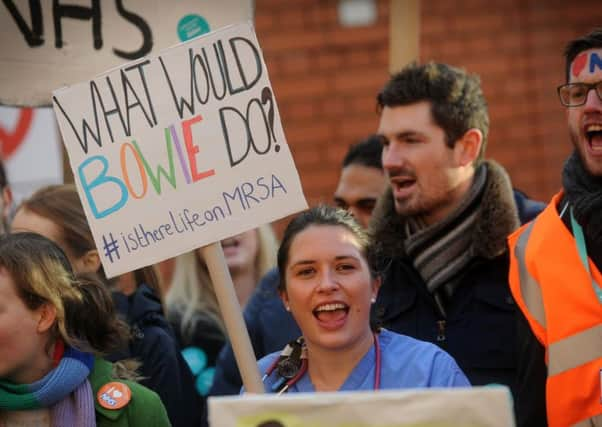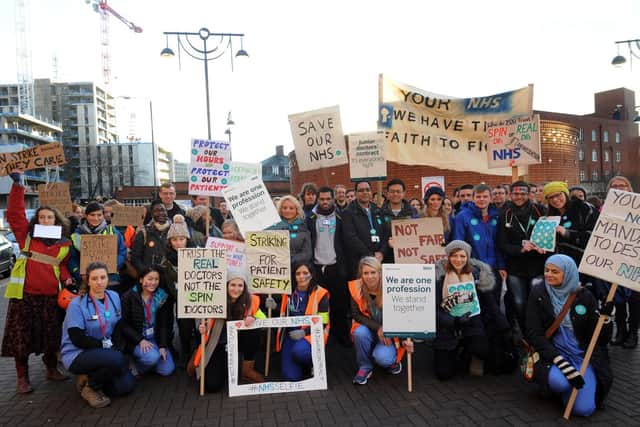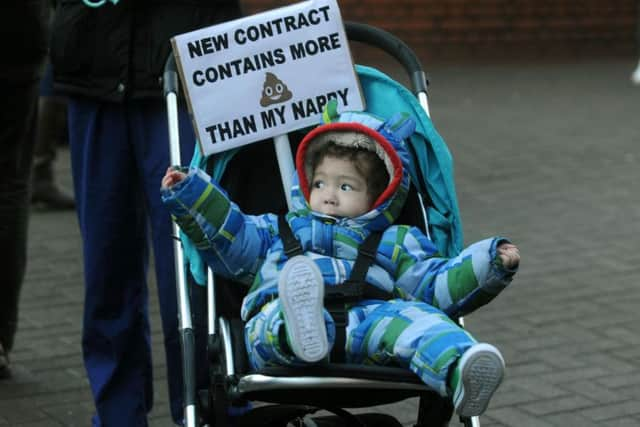Five things we learned from the junior doctor strike in Yorkshire


A spokesman for the Advisory, Conciliation and Arbitration Service (Acas) has announced that talks between the Government and the British Medical Association (BMA) would resume on Thursday at 10am, continuing on Friday.
It comes thousands of juniors nationwide returned to work this morning after a 24-hour period of reduced 'emergency care only' staffing that ended at 8am following the cancellation of 4,000 planned operations nationwide.
Advertisement
Hide AdAdvertisement
Hide AdAround 50 of those operations, and more than 400 appointments, were due to take place at Leeds Teaching Hospitals NHS Trust but had to be postponed.
It appears that there is still a gap between the stances of both sides but, following the disruption of strike day one, a resolution has become even more of a priority.
Strike action comes amid a dispute over the reform of junior doctor contracts. The Government’s last offer includes an 11 per cent basic pay rise. But this is offset by plans to cut the number of hours on a weekend for which juniors can claim extra pay for unsocial hours.
The BMA argues that the proposed changes make the contract “unsafe and unfair” on both doctors and patients as it would also see working hour safeguards scrapped. The Government says its changes are necessary in its aim for a “truly seven-day NHS” and claims that only one per cent of doctors would lose pay.
Five things we learned from the first junior doctor strike:


Advertisement
Hide AdAdvertisement
Hide Ad- Time is of the essence - The next scheduled strike, a 48-hour period of reduced 'emergency care only' staffing from January 26 at 8am, is less than a fortnight away. It is double the length of the first strike, which saw one West Midlands hospitals trust declare a "level 4" major incident, so such issues with capacity are likely to be amplified next time around. If progress in negotiations isn't made by then, a nine-hour full walk-out of tens of thousands of junior doctors in England could take place on February 10, which will take the amount of pressure on hospitals to a whole new level. The Government and the BMA are well aware of the serious impact a full strike could have.
- This is no ordinary dispute - The BMA estimated that there were 150 pickets staged over the junior doctor contract dispute in England yesterday, with dozens organised across Yorkshire as every major hospital in the region was surrounded by placard-waving clinicians. Junior doctors took to the streets all over the country to engage with the public during Meet the Doctors events and staged basic first aid sessions all over Yorkshire, while some protesters showed their strength of feeling in other ways. The National Health Singers choir joined picketers outside Great Ormond Street Hospital, in London, to voice their concerns just weeks after the Lewisham and Greenwich NHS Trust's NHS Choir claimed the Christmas number one spot with their health service-celebrating track 'A Bridge Over You'. Yesterday one group of Leeds junior doctors also decided to show their community spirit by helping to clear flood-hit business premises during the relief effort in Kirkstall during the 24-hour strike.
- Junior doctors in Yorkshire have humour on their side - Despite the serious messages surrounding the effect a reformed contract for juniors could have on patient care, some trainees in the White Rose took to the debate with trademark Yorkshire wit. One protester at Leeds General Infirmary's placard emblazoned with the tongue-in-cheek slogan ‘What would Bowie do? #istherelifeonMRSA’ raised a few smiles amid a heated health care dispute, while football-style chants of 'Ole, ole, ole, ole, BMA, BMA' made a space outside the Jubilee Wing resemble sporting terraces.
- Neither side looks like budging - Health Secretary Jeremy Hunt has claimed that the Government will return to Acas-led talks with the BMA "any day" but remains defiant in his pursuit of a "truly seven-day NHS". Mr Hunt claimed last week that before negotiations broke down 15 of 16 issues outlined as concerns by the BMA had been resolved but that summary has been disputed by union chiefs. BMA council chairman Dr Mark Porter claims there are still "some serious issues about patient safety and recognition of junior doctors' contributions that need to be sorted" which he says the Government is still refusing to acknowledge.


Advertisement
Hide AdAdvertisement
Hide Ad- Elusive Health Secretary - A video clip emerged during the strike action that saw one of Jeremy Hunt's Government aides try to stop a Sky News reporter asking questions about his whereabouts. After being asked of Mr Hunt's whereabouts Norman Williams, his senior clinical adviser, told Sky's Darren McCaffrey: "Hang on a minute, we're not doing any of this nonsense... we agreed a series of questions." After the incident Mr McCaffrey said: "Having spent all day trying to get an interview with Health Secretary Jeremy Hunt, I felt it was fair enough to ask his adviser where he was. He had declined all interview requests, despite calls for him to answer questions from doctors and patients. Instead, the UK broadcast media was offered a senior official from the NHS England by the Department of Health to do one interview for all of us."